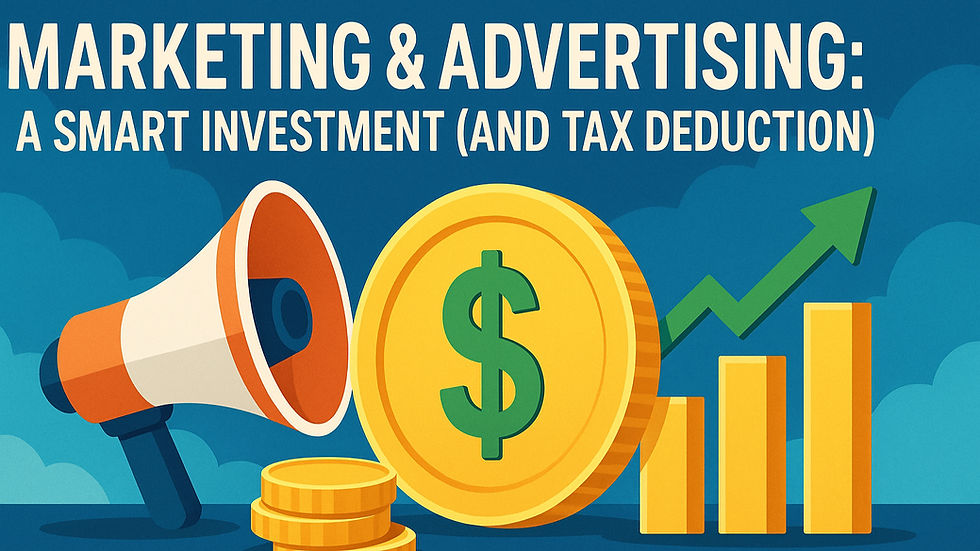Marketing & Advertising: A Smart Investment (and Tax Deduction)
- Jared Dalton

- Aug 11, 2025
- 4 min read

Marketing as an Investment: ROI and Growth
In the business world, marketing isn’t just an expense – it’s an investment. Companies spend about 9% of their revenue on marketing on average, and for good reason. Effective marketing drives brand awareness, customer acquisition, and revenue growth. In fact, the vast majority of small businesses report that money spent on marketing is money well spent – 70% of small businesses with a marketing budget say their marketing spend was a good investment, versus only 7% who disagreed. High returns are common: many firms aim for a 5:1 return on investment (ROI) (five dollars in revenue for every dollar spent), and some tactics deliver even more. Email marketing, for example, can yield an average ROI of $42 for every $1 spent– a staggering 4200% return that highlights how powerful the right strategy can be.
Crucially, investing sufficiently in marketing tends to pay off. Businesses that allocate healthy budgets toward advertising see significantly better outcomes. One survey found that 48% of small businesses who dedicate around 6–10% of their budget to marketing report their efforts as successful, compared to just 11% of businesses who spend less than 5%. In other words, under-investing in marketing often means missing growth opportunities. It’s no surprise, then, that companies are doubling down on marketing: 63% of small businesses plan to increase their marketing budgets in the next year as they recognize the strong ROI marketing can deliver.
Marketing Budget Trends. The graphic above illustrates how small businesses allocate their budgets and their future plans. 44% of small businesses typically allocate 6–10% of their total budget to marketing, making it the most common investment level. Meanwhile, 63% plan to increase their marketing budget in the next 12 months (only 8% plan to decrease), reflecting widespread confidence in marketing’s value. The trend is clear: companies that want to grow are investing more in marketing, not less, because they see it paying off in tangible results.
Advertising Expenses Are Tax-Deductible
Beyond the direct benefits of growth and sales, there’s another smart reason to invest in marketing: tax savings. The IRS classifies most advertising and marketing costs as “ordinary and necessary” business expenses, which means they are fully tax-deductible for your business. In simple terms, every dollar you spend on legitimate marketing can reduce your taxable income by the same amount. This deduction effectively subsidizes your marketing spend – if your business is in, say, the 30% tax bracket, a $10,000 marketing campaign could save you about $3,000 in taxes. You’re investing in growth and getting a break at tax time.
However, many businesses don’t take full advantage of these benefits. Alarmingly, more than 1 in 4 small business owners didn’t know their marketing expenses are tax-deductible. And even among those who do know, not everyone remembers to claim the write-off. In fact, up to 90% of business owners overpay on taxes by failing to write off all eligible expenses – and marketing costs are often among the overlooked deductions. Don’t leave money on the table. The tax code is essentially encouraging you to market your business by allowing these write-offs, so be sure to utilize them. As long as your advertising or promotional expense is common for your industry and helpful for generating business, it likely qualifies as a deductible expense.
What kinds of marketing expenses can you write off? Generally, any expense incurred to promote your business, build your brand, or attract customers may be deductible. Here are some common examples of tax-deductible marketing and advertising expenses:
Online and digital advertising – e.g. social media ads, Google Ads, email marketing campaigns.
Website development and maintenance – design costs, hosting fees, and ongoing web content updates.
Promotional materials – business cards, brochures, flyers, banners, and other printed marketing collaterals.
Traditional media advertising – TV commercials, radio spots, newspaper or magazine ads, billboards.
Event marketing – trade show booth costs, industry conference fees, sponsorships for events, and other promotional events.
Search Engine Optimization (SEO) services – costs for improving your website’s search rankings and online visibility.
Branding and design – logo design, graphic design, and branded merchandise (swag with your company logo).
Content creation – expenses for blogs, video production, podcasts, photography or copywriting aimed at marketing your business.
Marketing consultants or agency fees – the cost of hiring marketing agencies or freelance consultants to plan or execute campaigns.
All the above and more can typically be written off at 100% as business expenses, as long as they are “ordinary and necessary” for your operations. Always keep good documentation (invoices, receipts) for these costs and consult with your accountant to ensure you categorize and claim them properly. The ability to deduct marketing costs means your effective cost of advertising is lower than it seems, after the tax benefit is factored in. It’s like getting a partial refund on your marketing spend from the government.
Bottom line: Paying for marketing and advertising is one of the smartest moves you can make for your business. It’s an investment that drives growth and often pays for itself through increased revenue. And with the bonus of tax deductibility, your marketing expenses come with a built-in “discount” at tax time. Rather than skimping on marketing, savvy business owners budget for it, knowing that strategic marketing fuels business expansion while the tax deductions help offset the cost. In short, you’re growing your business and saving money simultaneously – a win-win for your bottom line.
Ready to maximize your marketing ROI (and reap the tax benefits)? Visit www.thejareddaltonagency.com to learn more about how we can help you leverage smart marketing strategies to drive your business forward.



Comments